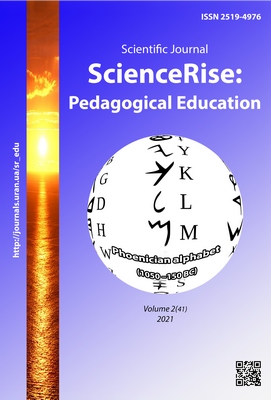Professional competencies of students of physical and mathematical specialties
DOI:
https://doi.org/10.15587/2519-4984.2021.228249Keywords:
professional competence, scientific worldview, interdisciplinary connections, critical thinking, higher educationAbstract
The article outlines the issues of professional competence of senior students of physical and mathematical specialties. A comparative description of their professional competencies is given, common and specific components are identified. It was found that in combination with traditional pedagogical teaching methods (based on the student's reproductive activity), it is important to introduce the latest methods, which provide special attention to the formation of professional competencies of university graduates. It is substantiated that physics is inextricably linked with mathematics. Mathematics gives physics the means and techniques of general and accurate expression of the relationship between physical quantities, which are discovered as a result of experiment or theoretical research. Therefore, the content and methods of teaching physics depend on the level of mathematical training. It is shown that the teaching of physics and mathematics should be based on the mutual use of elements of mathematics in the course of physics and physical concepts in the study of algebra and the principles of analysis, because it accelerates mental development and formation of scientific worldview of students. The importance of interdisciplinary connections as a component of interdisciplinary integration in order to optimize the educational process is revealed. The question of possibilities of creation of physical and mathematical discipline and a set of competences which future experts should possess is considered. It was found out that for future specialists such an approach would allow to carry out the educational process in accordance with the requirements of modern dynamic educational space, acquire new skills, be more competitive, but at the same time due to a large number of discrepancies in the competences of physics and mathematics
References
- Simaeva, N. P. (2010). Professional the competence of students of economic and legal specialities: the general and especial in the contents and formation conditions. Vestnik VolGU, 12, 50–59.
- Wong, A. Y., Daud, K. (2018). ICT Competencies among School Teachers: A Review of Literature. Journal of Education and Learning, 12 (3), 376–381. doi: http://doi.org/10.11591/edulearn.v12i3.5579
- Foxon, M., Richey, R. C., Roberts, R. C., Spannaus, T. W. (2003). Training Manager Competencie. ERIC Clearinghouse on Information and Technology, 177.
- Zhalinskii, A. E. (2009). Vvedenie v spetsialnost «IUrisprudentsiia». Professionalnaia deiatelnost iurista. Moscow: Prospekt, 368.
- Ostanina, S. A., Ptitsyna, E. V. (2019). Competence approach to teaching University students in conditions implementation of educational standards of the third generation. World of Science. Pedagogy and psychology, 5, 1–12.
- Febrianis, I., Muljono, P., Susanto, D. (2014). Pedagogical competence-based Training Needs Analysis for Natural Science Teachers. Journal of Education and Learning, 8 (2), 144–151. doi: http://doi.org/10.11591/edulearn.v8i2.216
- Rakov, S. A. (2005). Formuvannia matematychnykh kompetentnostei vypusknyka shkoly yak misiia matematychnoi osvity. Matematyka v shkoli, 5, 2−8.
- Neporozhnia, L. V. (2016). Methodical features of formation of natural and scientific competence of seniors at physics lessons. Zb. nauk. prats. Seriia: Pedahohika, 22, 96–99.
- Mantula, T. I. (2005). Integrirovannoe prepodavanie i mezhpredmetnye sviazi v istoricheskom aspekte i segodnia. Vіsnik Zhitomirskogo derzhavnogo unіversitetu, 21, 95–99.
- Csilla, D. T. Kompetenciákról általánosságban. Available at: https://gramontinternational.com/hu/kompetenciakrol-altalanossagban
- Zoltán, N. (2017). Közép-kelet európai generációk digitális kompetencia és biztonságtudatosság vizsgálatának eredményei. Hadmérnök, 12 (4), 159–172.
Downloads
Published
How to Cite
Issue
Section
License
Copyright (c) 2021 Livia Mesarosh

This work is licensed under a Creative Commons Attribution 4.0 International License.
Our journal abides by the Creative Commons CC BY copyright rights and permissions for open access journals.
Authors, who are published in this journal, agree to the following conditions:
1. The authors reserve the right to authorship of the work and pass the first publication right of this work to the journal under the terms of a Creative Commons CC BY, which allows others to freely distribute the published research with the obligatory reference to the authors of the original work and the first publication of the work in this journal.
2. The authors have the right to conclude separate supplement agreements that relate to non-exclusive work distribution in the form in which it has been published by the journal (for example, to upload the work to the online storage of the journal or publish it as part of a monograph), provided that the reference to the first publication of the work in this journal is included.







